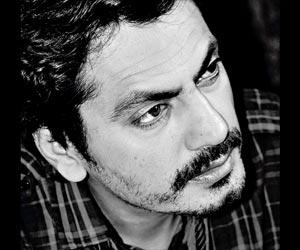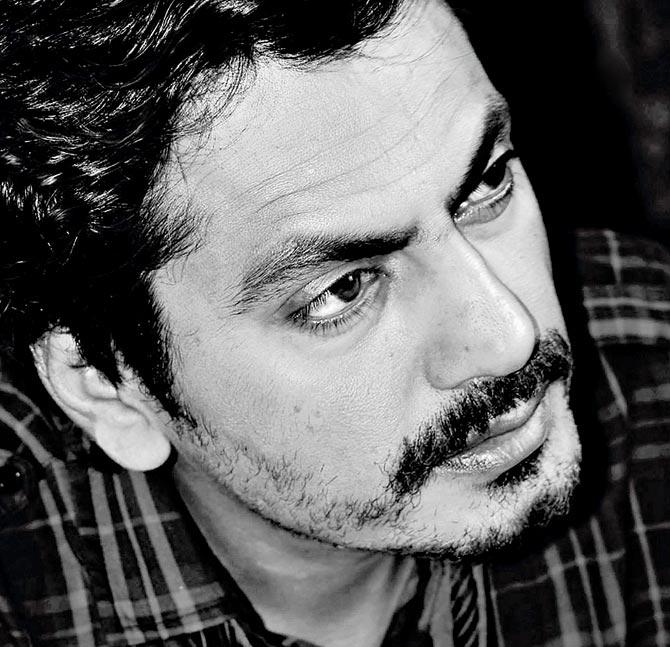Why the actor must chop a few paras from his pulped memoir and bring it out to the public soon

Nawazuddin Siddiqui on the jacket of his pulped memoir, An Ordinary Life
The recurring theme, all through actor Nawazuddin Siddiqui's life thus far, appears to be a relentless craving for female attention/acceptance/adoration. God knows, that inherent desire might well constitute the sub-conscious history of mankind itself. But very few people uninhibitedly lace their life's narrative around that single search (and some finds), as Siddiqui does in his memoir, An Ordinary Life. This intuitively makes sense to me, because he's only being viscerally honest in his expression, rather than intellectualising his existence to suit a certain readership.
ADVERTISEMENT

Nawazuddin Siddiqui on the jacket of his pulped memoir, An Ordinary Life
To go off on a tangent, a major problem VS Naipaul has with Mahatma Gandhi's autobiography My Experiments With Truth is that while Gandhi writes interestingly about issues that concern him, and the route he charted towards public life, he has absolutely nothing to say about the grandeur of imperial England (or its social mores) that would have struck anyone at first sight -especially a boy from Porbander, under the age of 20, transported over months, to study law in London, the biggest city in the world in 1888. Naipaul finds this rather pretentious.
Isn't that similar to Neil Armstrong landing on the moon? You really think the first words out of Armstrong's dropped jaw would've been, "That is one small step for man, one giant leap for mankind blah." "Woah! What the…" is more likely to be the case! Coming back to Siddiqui. Siddiqui comes from Budhana - a hamlet in western Uttar Pradesh that he says is infamous for 2G, namely 'ganna' (sugarcane), and guns. Girls mixing with boys more often could give his hometown in Muzaffarnagar district a more wholesome 3G network of friends and acquaintanceship. But like in most of India, that isn't the case, as Siddiqui first eyeballs a girl at 14 to establish a romantic relationship, walking to and from his sarkari school at 10 am and 4 pm. I'm sure this is the story of every boy in Budhana. But Siddiqui is the only one from that town that we know.
His life interests us, because he's just such a fine actor - among the best ever, and certainly the rare, proper rags-to-riches story in contemporary showbiz. Of course, Siddiqui went to National School of Drama. So have hundreds before, and after him. What is it about his life in particular that he channels into his craft? Siddiqui offers one very incisive perspective. It's to do with 'leh', or rhythm. In his hometown, he writes, you can get away being 'besura' (tone-deaf), but not 'betaal' (off-rhythm), which makes your words and delivery totally irritating to the ears. The colourful people he grew up around - blessed with rhythm in their manners and speech - he confesses, are the ones he repeatedly reprises in his roles. One unfortunately rhythmic bloke (a struggling actor called Mukesh Bhatt in Bombay) he unabashedly imitated for his part in The Lunchbox. The struggler has found it impossible to get acting jobs ever since, since everyone believes he imitates Siddiqui from The Lunchbox instead!
Clearly, there is more to Siddiqui's performances than mimicry. His best turn (at any rate, the best last year) was as the serial killer Sindhi Dalwai (Ramanna) in Anurag Kashyap's Raman Raghav 2.0, that had him nurse an actual lunatic inside his system. He got sick, hospitalised in the process, found himself muttering in his sleep, and he began to fear himself. 'Method acting', he patiently explains later, is very different from the mockery some actors make of it in its name. Siddiqui's delved into a lot of the anecdotes in his memoir in a thoroughly entertaining interview I once did with him (it's available on YouTube). And that's not because he was quite opening up, but because I had to literally coax them out of him, based on stuff I had read/heard already. Although I'm told he's got much better now, the utterly reticent Siddiqui is not an easy conversationalist. He can be extremely evasive and deadpan about himself, which one finds rather odd for an expressive actor, and yet he comes alive as someone altogether anew on screen, with almost every successive film, leaving behind traces of what sets him apart as an actor still. As a person, he can fade in the background.
To go off on another tangent, Nehru similarly described India as "an ancient palimpsest on which layer upon layer of thought and reverie had been inscribed, and yet no succeeding layer had completely hidden or erased what had been written previously." An ability to be effortlessly malleable, flexible, or an actor with "zero screen presence", as Kashyap called Siddiqui once, can be a huge asset - as much for an actor as a country/community. You can explore so many facets. I just finished reading Siddiqui's memoir, which he's had to pulp and withdraw from the market, fearing legal consequences over unnecessarily lurid details in it on his affair with a co-actor. Excising those paragraphs will make no difference to his essential journey. I'm sure the account was significant from his point of view. His sex life (or the lack of one) is of more interest to him than a film buff. I can see he's only being candid about his genuine fancies, and it's fair to a memoir. But seriously, who cares, if that's the reason the book itself is not out?
Mayank Shekhar attempts to make sense of mass culture. He tweets @mayankw14 Send your feedback to mailbag@mid-day.com
Catch up on all the latest Mumbai, National and International news here
Download the new mid-day Android and iOS apps to get updates on all the latest and trending stories on the go
 Subscribe today by clicking the link and stay updated with the latest news!" Click here!
Subscribe today by clicking the link and stay updated with the latest news!" Click here!







